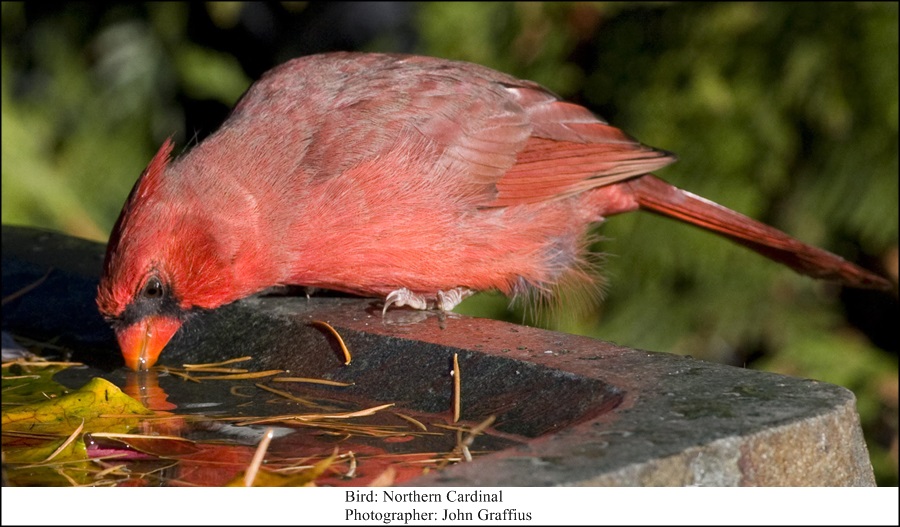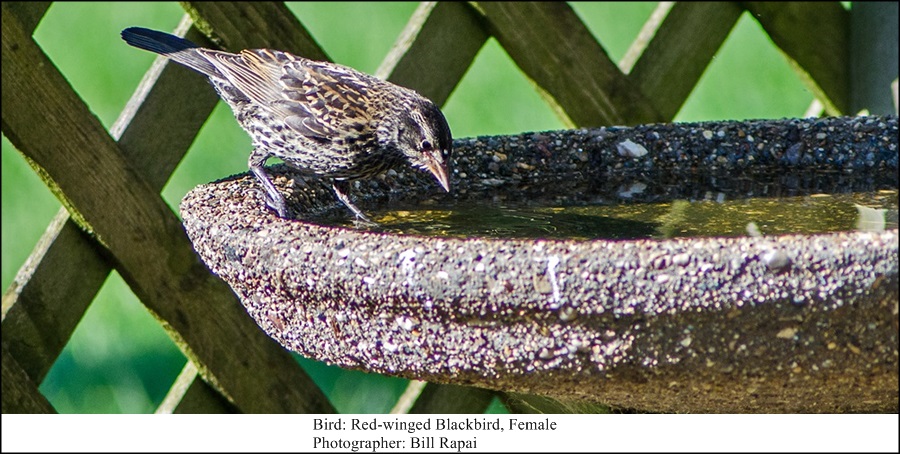During the hot and sometimes dry conditions that we face in the summer, birds can use a reliable source of water. Whether they are birds that are visiting your feeders or not, all birds need a source of water and will come to a birdbath or pond. At Wild Birds Unlimited in Grosse Pointe Woods, we want to help you take care of your resident birds as well as attract migrating birds to your yard.
We know that water is essential to all living creatures. In the case of birds, it is vitally important when it is extremely hot and a bird’s ability to regulate its body temperature can be stressed. Birds do not sweat and must remove excess body heat through their respiratory system. When the temperature rises, a bird’s respiration rate increases, sometimes to the point where it can be seen panting like a dog. Panting in this way can dehydrate a bird and increase their need for a reliable source of water to replace lost fluids.
Birds that are familiar with your yard will know where the birdbath is and take advantage of your generosity. Those birds that migrate for purposes of nesting, such as orioles and catbirds, will locate water with their sense of hearing. A moving spring will bring in birds like a magnet. By using a mister or dripper, you can create the same sounds as that moving spring, and entice birds more readily as they hear the water dripping into the bowl. Small pumps that cause the water in the bath to move will also make the birdbath more attractive to the birds that are passing by! Misters have been known to attract hummingbirds and small migrant birds, such as warblers and vireos. They fly through the mist or roll in the water that has collected on leaves.
Bi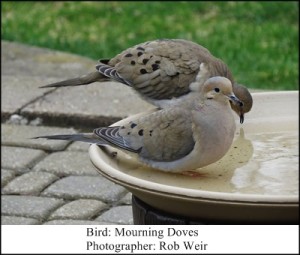 rds drink water by dipping their bill into the water, holding the water in their mouth, and then tipping their head up at a sharp angle, causing the water to flow down their throat. The exceptions to this rule are doves and pigeons, which have the ability to suck water into their mouths.
rds drink water by dipping their bill into the water, holding the water in their mouth, and then tipping their head up at a sharp angle, causing the water to flow down their throat. The exceptions to this rule are doves and pigeons, which have the ability to suck water into their mouths.
Bathing serves a different purpose for birds, keeping them “groomed”. The dust and dirt are removed as you would guess, but the preening that follows afterward is essential for feathers to function at their best. As birds preen, they grasp the feather at the base with their bill and move their beak along the feather, smoothing the feather barbs so that they lock together. Any dirt or oil that remains in the feathers after bathing is removed during preening.
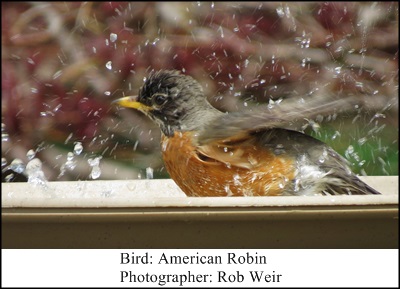 Robins are vigorous bathers. They take up the entire bath, dipping down into the water and throwing it over their backs with their wings. Other birds are not quite so boisterous. Chickadees and Goldfinches approach the bath with caution and will enter from the edge. The water needs to be shallow for them to feel safe enough to actually bathe. Adding a few small rocks to the edge of your birdbath can entice smaller birds to feel safe enough to bathe as well as drink.
Robins are vigorous bathers. They take up the entire bath, dipping down into the water and throwing it over their backs with their wings. Other birds are not quite so boisterous. Chickadees and Goldfinches approach the bath with caution and will enter from the edge. The water needs to be shallow for them to feel safe enough to actually bathe. Adding a few small rocks to the edge of your birdbath can entice smaller birds to feel safe enough to bathe as well as drink.
Ideally, the water in the bath should be dumped out daily, and refilled with fresh water. When emptying the bowl, use a scrubber brush to clean the bowl. This is helpful in preventing the build up of algae and mineral deposits and removing the “dirty bath tub ring”. Rinse thoroughly before refilling the bath.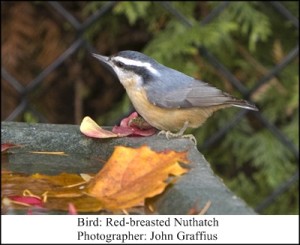
There are liquid solutions that can be added to the birdbath water, designed to prevent mineral deposits including crusty white scale, iron, copper and hard water stains. This does not prevent the need to clean daily as you will still have bird droppings in the water. Birds defecate when they bathe, making the water unhealthy for them to drink.
Fresh water not only benefits the birds, it prevents mosquito larvae from developing into mosquitoes. The process takes 7 to 10 days from the time a mosquito lays her eggs on the surface. Since the water needs to be stagnant for a mosquito to develop from an egg, changing the bird bath water prevents this from happening.
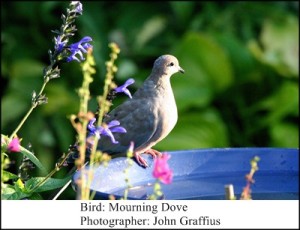 Every so often we need to deep clean the bird bath no matter how hard we try to keep it clean. A solution of nine parts water to one part white vinegar will do the trick (bleach is often recommended – I find it harsher than necessary).
Every so often we need to deep clean the bird bath no matter how hard we try to keep it clean. A solution of nine parts water to one part white vinegar will do the trick (bleach is often recommended – I find it harsher than necessary).
Placing your bird baths in the shade helps to reduce algae growth, slows water evaporation and keeps the water fresh longer. Also, birds can’t fly well when they’re wet, which makes them vulnerable to predators when they’re bathing. With the cover of shrubs or trees close by, birds will feel safe because they can escape if they sense a cat or a hawk. This placement also allows the birds to have quick access to a perch where they can groom their feathers. After bathing for a few minutes, a bird usually perches in a sunny spot and fluffs its feathers out to dry. Then it carefully preens each feather, adding a protective coating of oil secreted by a gland at the base of its tail.
Offering a dependable source of water is probably the simplest thing you can do to increase the variety of birds in your yard. It can also significantly increase your enjoyment of birds as it allows you to watch their antics as they drink, bathe and preen.
Grab those binoculars and enjoy your birds!
Have you joined our email list? Click here to sign up, it’s free and gives you access to sales, coupons, nature news, events, and more!

